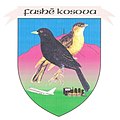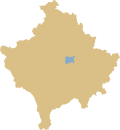Fushë Kosova
|
Fushë Kosova / Fushë Kosovë 1 Kosovo Polje / Косово Поље 2 |
||||
|
||||
| Basic data | ||||
|---|---|---|---|---|
| State : |
|
|||
| District : | Pristina | |||
| Municipality : | Fushë Kosova | |||
| Coordinates : | 42 ° 38 ' N , 21 ° 6' E | |||
| Residents : | 12,919 (2011) | |||
| Telephone code : | +383 (0) 38 | |||
| License plate : | 01 | |||
|
1 Albanian (indefinite / definite form) , 2 Serbian (Latin / Cyrillic spelling) 3 Kosovo's independence is controversial. Serbia continues to regard the country as a Serbian province. |
||||
Kosovo Polje [ fuʃ kɔsɔva ] ( Albanian also Fushë Kosovë [ fuʃ kɔsɔv ]; Serbian Косово Поље Kosovo Polje , [ kɔsɔvɔ pɔljɛ ]) is a town and headquarters of the homonymous municipality in central Kosovo , only about five kilometers southwest of the capital Pristina area.
Surname
Kosovo Polje means blackbird field ; this is also used in German as a synonym for the entire region. The term Kosovo goes back to the Serbian name of the area ( kos : " Amsel ", polje : "field", correctly declined kosovo polje ), which translated means Amselfeld , where the German name often used comes from.
The city of Kosova is called Ovası in Turkish . The Turkish name was also known when Kosovo was under Ottoman rule .
geography
The place is located at an altitude of 543 meters above sea level on the eastern slope of a wide valley formed by the Sitnica River . The railway line from Skopje to Mitrovica , which used to lead via Kraljevo to Belgrade , runs on the western edge of the city . This is where the route from West Kosovo to Pristina crosses . At this intersection is the Fushë Kosova train station .
history
On June 28, 1389, the Battle of the Blackbird Field took place near the present-day location , one of the greatest battles of the time when the Serbian army, led by Prince Lazar Hrebeljanovićs, faced the Ottoman army led by Murad I. The conflict arose from the offensive action of the Ottomans against the independent Serbian Empire . Murad I tried to subordinate the empire to the sovereignty of the Ottoman Empire, but Lazar Hrebeljanović offered bitter resistance to the advancing Ottomans, and previously defeated them several times. The battle on the blackbird field leads the future centuries-long rule of the Ottoman Empire over the area, which previously belonged to the Serbian territory for several centuries.
As early as 1864, Circassians settled in the area of Fushë Kosova , but they left the area again after one or two years. The present village was founded in 1921 as a Serbian colony with the name Kosovo , in February 1937 it was renamed Kosovo Polje . Between 1921 and 1925, 98 predominantly Serb families settled here, including from central Serbia , Bosnia , Montenegro and the Lika .
Until the beginning of the Kosovo war in 1999, Kosovo Polje was mostly inhabited by Serbs, with the Albanian population increasing significantly, especially in the last decades of the 20th century. This has led to unrest between the two population groups since around 1981. On the one hand, the Serbs felt that their supremacy was threatened, on the other hand, the Albanians wanted a greater say in political decisions. It was in this atmosphere that Slobodan Milošević gave a speech in 1987 in the town's cultural center. The mostly Albanian provincial police denied access to the building to an angry Serbian crowd. When Milošević stepped in front of the building and people shouted “They are hitting us!”, He replied: “Nobody is allowed to hit you!”. Since this was documented and disseminated on site by television cameras, the nationalist mood in the then autonomous province was further fueled.
Even after the war in Kosovo, there was still a large Serbian population in the city. There was also a larger Roma settlement. In March 2004 more than 100 houses inhabited by Serbs and Roma were burned down as part of pogroms by Albanian nationalists. The post office, the Serbian school and the Serbian hospital also went up in flames. After that, the majority of the Serbian population fled the city, so that today only a minority live there.
population
In Fushë Kosova, the 2011 census recorded 12,919 inhabitants: 12,295 (95.17%) Albanians , 462 (3.58%) Roma , Ashkali and Balkan Egyptians , 48 Serbs , 42 Turks , 18 Bosniaks and 15 Gorans . 27 people indicated a different ethnicity.
| census | 1948 | 1953 | 1961 | 1971 | 1981 | 1991 | 2011 |
|---|---|---|---|---|---|---|---|
| Residents | 847 | 1,122 | 2,423 | 6,992 | 12,917 | 16,154 | 12,919 |
Sports
The local football club KF Fushë Kosova is based in Fushë Kosova .
traffic
The city is the most important junction in the railway network of the railway company Trainkos . This is where the north-south connection from Kraljevo in western Serbia to North Macedonia and the east-west connection from Niš via Pristina to Peja and Prizren intersect . The station was until the beginning of the Yugoslav wars station stop many express trains, including the Acropolis Express from Munich main station to Athens . The remaining connections are currently without rail traffic.
Web links
Individual evidence
- ^ Atanasije Urošević: Kosovo . Belgrade 1965, p. 221-223 ( scribd.com ).
- ↑ Ethnic composition of Kosovo 2011. In: pop-stat.mashke.org. Retrieved January 8, 2018 .
- ↑ Kosovo censuses. In: pop-stat.mashke.org. Retrieved May 3, 2018 .




